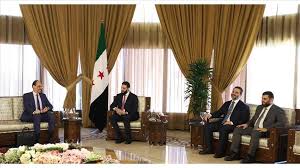
On May 20, 2025, Kalin held a landmark meeting with Syrian intelligence chief Hussein al-Salama in the Syrian capital
On Wednesday, Ibrahim Kalın, head of Türkiye’s National Intelligence Organisation (MIT), arrived in Damascus for talks with Syrian President Ahmed al-Sharaa. The visit marks a deepening of Ankara–Damascus engagement amid ongoing instability in Suweida province. According to Turkish sources, discussions will focus on regional security, bilateral coordination, and countering external interference—particularly from Israel.
This is not Kalın’s first foray into Damascus. On May 20, 2025, he held a landmark meeting with Syrian intelligence chief Hussein al-Salama in the Syrian capital, signalling Ankara’s willingness to elevate political and security dialogue with the post-Assad leadership. That session was widely seen as a precursor to today’s high-level talks with al-Sharaa.
Background: A Shift in Ankara–Damascus Relations
Since the fall of Bashar al-Assad in late 2024, Turkey has recalibrated its Syria policy—from backing opposition forces to cooperating with the new leadership. Ankara’s priorities include preventing Kurdish statehood in the northeast, repatriating Syrian refugees, and containing Israeli expansion. President Recep Tayyip Erdoğan’s meeting with al-Sharaa in Doha earlier this year underscored this pivot, as did Ankara’s support for integrating the Syrian Democratic Forces (SDF) into Damascus’s institutions.
Bilateral cooperation has expanded rapidly. In August, defence ministers from the two countries signed a cooperation accord enabling Turkish military support through training, weapons supply, and logistical tools. Shortly thereafter, Turkish National Education Minister Yusuf Tekin met his Syrian counterpart, Mohammed Abdul Rahman Turko, to coordinate recovery and rebuilding efforts. “We believe that we grow stronger when our neighbour is strong,” Tekin declared, emphasising the shared social and historical bonds between the two nations.
Suweida Crisis: A Strategic Concern
Kalın’s latest visit comes amid deadly sectarian violence in Suweida, where clashes between Druze and Bedouin groups have claimed more than 400 lives. The conflict has drawn Israeli airstrikes and calls for international protection from Druze leaders. Turkey fears the crisis could be exploited by Israel to undermine Syria’s cohesion and derail Kurdish integration efforts.
Kalın is coordinating with U.S. and regional actors to de-escalate tensions, enforce ceasefires, and reaffirm Syria’s territorial integrity. His discussions are also expected to revisit the March 2025 agreement with Mazloum Abdi on the SDF’s integration into the Syrian state, amid reports of breaches and continued friction in the northeast.
Strategic Priorities
Key discussion areas include:
Security Cooperation: Intensifying joint operations against ISIS, PKK, and destabilising SDF elements.
Suweida Stabilisation: Supporting displaced civilians, enforcing ceasefires, and rejecting Druze autonomy demands.
Israeli Activity: Opposing any buffer zone in southern Syria that undermines Damascus’s sovereignty, while condemning Israeli airstrikes.
Broader Recovery: Facilitating refugee return, expanding Turkish defence and educational cooperation, and navigating U.S. involvement.Ankara’s Calculated Engagement
Social media commentary and regional analysis highlight the symbolic weight of Kalın’s visit. Observers note that Ankara’s proactive role is intended to prevent fragmentation, strengthen al-Sharaa’s leadership, and reassert Turkey’s influence in the shifting regional order.
If successful, the visit could mark a turning point—advancing SDF integration, stabilising Suweida, and consolidating Syrian cohesion. Yet failure risks entrenching divisions, empowering Israel, and leaving Ankara’s long-term vision for Syria unfulfilled.
